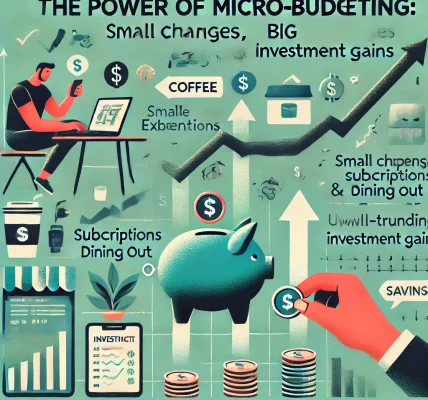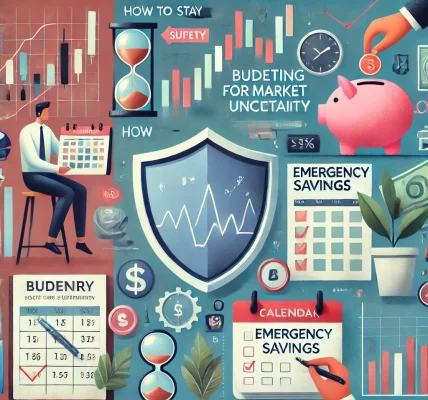Living with an irregular income can present unique challenges when it comes to budgeting. Whether you’re a freelancer, contractor, business owner, or someone who experiences seasonal or unpredictable income, managing your finances can feel daunting. However, with the right strategies in place, budgeting on an irregular income is not only possible but can be a great opportunity to develop a more disciplined and thoughtful approach to managing your money.
In this blog, we’ll walk you through effective techniques to budget with an irregular income, reduce financial stress, and work toward your financial goals, even when your earnings fluctuate month to month.
Understanding the Challenges of an Irregular Income
Unlike a salaried job, where income is predictable and consistent, irregular income can vary each month based on the number of hours worked, projects completed, or business performance. This unpredictability makes it difficult to plan for expenses and savings.
Some challenges of budgeting with an irregular income include:
- Inconsistent cash flow: Your income might be higher some months and lower in others.
- Difficulty in covering fixed expenses: Fixed costs like rent, utilities, and loan repayments don’t change, regardless of your income.
- Inability to save consistently: With fluctuating income, setting aside money for savings can be harder.
Despite these challenges, it’s entirely possible to manage your finances and even thrive with an irregular income. The key lies in being proactive and strategic with your budgeting approach.
Effective Strategies for Budgeting with Irregular Income
1. Track Your Income and Expenses Over Time
The first step in budgeting with an irregular income is understanding your financial patterns. Start by tracking your income and expenses for at least three months. This will give you a clearer picture of:
- The average amount you earn each month.
- The fluctuations in your income.
- Your essential and discretionary expenses.
You can use budgeting apps or spreadsheets to record and analyze your income and expenses. This data will be vital in creating a budget that aligns with your financial reality.
2. Calculate Your Average Monthly Income
To stabilize your budget, calculate your average monthly income. This means adding up your total income for a few months and dividing it by the number of months to get an average. For example, if you earned $5,000 in one month, $3,500 in the next, and $4,000 in the third month, your average monthly income would be:
($5,000 + $3,500 + $4,000) ÷ 3 = $4,167
Using this average will help smooth out the highs and lows of irregular income and make it easier to plan for monthly expenses.
3. Prioritize Essential Expenses
When your income fluctuates, it’s crucial to prioritize your essential expenses. These include:
- Housing costs (rent or mortgage)
- Utilities (electricity, water, internet)
- Insurance premiums
- Loan repayments (student loans, car loans, etc.)
- Groceries and transportation
Make sure these expenses are covered first before allocating money toward discretionary spending, like entertainment or dining out. You can set aside a portion of your average income to cover these essentials, regardless of fluctuations.
4. Create a Flexible Budget
A rigid budget can be challenging when your income varies. Instead, create a flexible budget that adjusts based on the amount of money you earn each month. Here’s how:
- Start with fixed expenses: These must be paid every month, so set them aside first.
- Estimate discretionary spending: This is the portion of your budget that varies, such as entertainment, dining out, and shopping. If you have a lower-than-average month, reduce discretionary spending.
- Set aside savings: Even with irregular income, it’s important to save. Make saving a priority, but the amount you set aside may fluctuate depending on your income for the month. Aim to save a percentage of your income rather than a fixed dollar amount.
A flexible budget allows you to adjust as needed, giving you control even in months when your income is lower than usual.
5. Build an Emergency Fund
Having an emergency fund is especially important when you have an irregular income. It acts as a buffer during months when income is lower, ensuring you can still cover essential expenses without stress. Aim to save 3 to 6 months’ worth of living expenses in your emergency fund.
Start by setting aside a small percentage of your income each month until you’ve built a sufficient cushion. Having this financial safety net provides peace of mind and stability during lean months.
6. Use the “Pay Yourself First” Strategy
The “pay yourself first” strategy involves treating savings as a non-negotiable expense. This is especially helpful when you have an unpredictable income. After you’ve covered your essential expenses, prioritize saving. Set aside a fixed percentage (such as 10-20%) of each paycheck into a savings account or investment fund before spending on anything else.
By treating savings as a top priority, you ensure that you’re consistently putting money aside for emergencies, long-term goals, or retirement, even if your income fluctuates.
7. Be Conservative with Non-Essential Spending
During months when your income is higher than average, it can be tempting to increase your spending on non-essential items. However, it’s important to stay disciplined. Even in good months, stick to your budget and resist the temptation to spend beyond your means. Saving any extra income for leaner months will give you greater financial flexibility and help you avoid overspending.
8. Automate Bills and Savings Contributions
To reduce the risk of forgetting to pay bills or contribute to savings, set up automated payments for essential bills and regular savings contributions. Many banks and financial institutions allow you to schedule automatic payments, so you won’t have to worry about missing payments during low-income months.
Automating your finances will save time and mental energy, allowing you to focus on other areas of your life without constantly worrying about budgeting.
Final Thoughts
Budgeting with an irregular income doesn’t have to be a daunting task. With the right strategies and a flexible mindset, you can manage your finances effectively and reduce the stress that often comes with fluctuating earnings. By tracking your income, prioritizing essential expenses, building an emergency fund, and automating your savings, you’ll be able to stay on top of your finances and achieve your financial goals, no matter how unpredictable your income may be.




